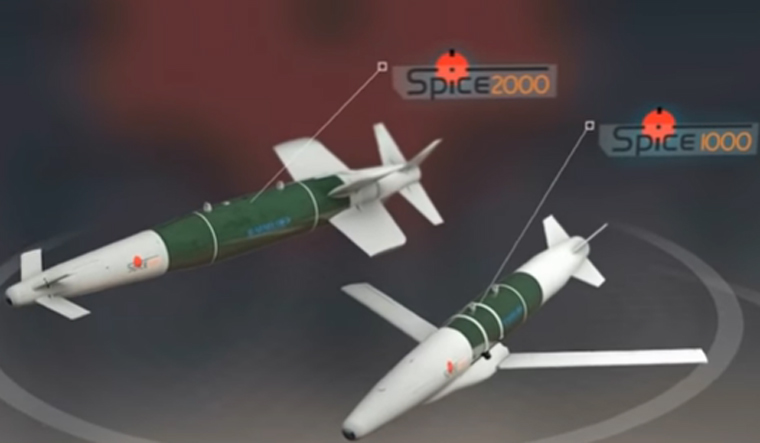Security sources say Israeli Rafael's 'Spice 2000' missiles were used against what New Delhi says was a terrorist training camp.
India's air force used Israeli-made bombs in its pre-dawn Tuesday airstrike on neighboring Pakistan, Indian security sources told local news website The Print and other media outlets.
According to the reports, five Mirage jets armed with Israeli-made Spice 2000 smart missiles attacked what New Delhi says was a terrorist training camp. Each missile weighs 1,000 kilograms and operates on pre-fed GPS coordinates. They are also fitted with technology making them invulnerable to jamming or deflection, the sources said.
Pakistan said there were no casualties, while New Delhi called the attack a pre-emptive strike that killed "a very large number" of militants.
The airstrike followed a suicide bombing in India's section of the disputed territory of Kashmir on February 14 that killed more than 40 Indian soldiers. Pakistan has denied involvement in the attack but vowed to respond to any Indian military operation against it.Several reporters, including an Associated Press journalist, trudged up the Kangaran Nallah hill to the site of Tuesday's bombing near the town of Balakot, close to the border with Pakistan's sector of Kashmir. They saw several large craters, a few upended trees and villagers wondering why they had been targeted.
Pakistan's military spokesman, Maj. Gen Asif Ghafoor, said Indian planes crossed into the Muzafarabad sector of Pakistani-controlled Kashmir. He said Pakistan scrambled its warplanes and the Indian jets released their payload "in haste" near Balakot.
India's Foreign Secretary Vijay Gokhale told reporters in New Delhi that Indian fighter jets targeted Jaish-e-Mohammad camps in a pre-emptive strike after intelligence indicated another attack was being planned.
Balakot Police Chief Saghir Hussain Shah said he had sent teams to the area where the Indian bombs reportedly hit, which he described as a mostly deserted wooded area. He said there were no casualties and no damage. There was no immediate explanation for the differing accounts, although India and Pakistan routinely contradict one another.Israel is considered a key weapons supplier to the Indian army, and arms deals between the two countries in recent years are estimated at a billion dollars each year. Over the past two years, the Israeli and Indian armies conducted joint drills, and senior Indian military officials visited Israel.
The Israel Aerospace Industries agreed in 2017 to supply air-defense systems to the Indian army, in what was described as one the of largest arms deals in they history of Israel's security industries.
The February 14 attack was the worst on Indian forces since the start of the 1989 insurgency in Kashmir and came as Indian Prime Minister Narendra Modi is in a re-election campaign.Kashmir, which is split between the two countries but claimed by each in its entirety, has been the cause of two wars between the neighbors. They fought a third war in 1979 over East Pakistan, which gained independence with the help of India and became Bangladesh.Insurgents in Indian-controlled Kashmir have been demanding either outright independence or union with Pakistan. India routinely accuses Pakistan of arming and training militants who cross the mountainous Himalayan region.
The Pakistan-based militant group Jaish-e-Mohammad claimed responsibility for the suicide bombing. The bomber, who made a video beforehand, was a resident of Indian-controlled sector of Kashmir.
After the airstrike, Lt. Col. Devender Anand, an Indian army spokesman, said Pakistani soldiers attacked Indian positions along the boundary in Kashmir, the so-called Line of Control. He called the attack an "unprovoked" violation of the 2003 cease-fire. He said there were no casualties and refused to discuss India's incursion into Pakistan.

No comments:
Post a Comment